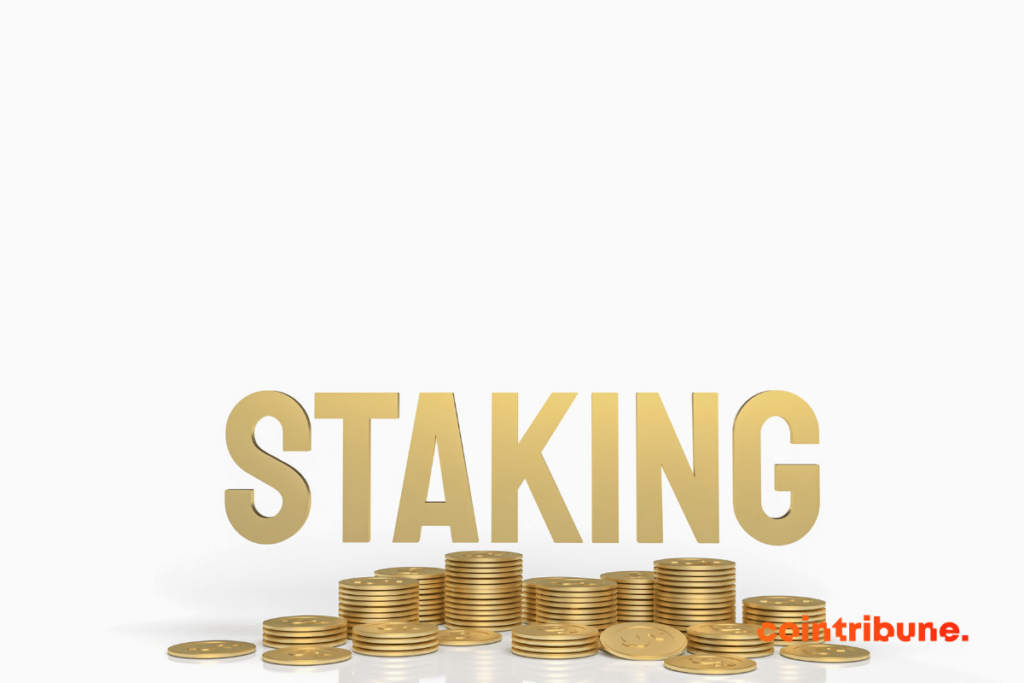What is Staking Taxation? 2024 Guide
Staking cryptocurrencies is an increasingly popular practice among investors seeking passive income. By locking their digital assets to support the operation of a blockchain network, they can receive regular rewards. However, in France, these incomes are subject to tax, and it is essential to understand the legislation to avoid unpleasant surprises. This article deciphers the tax obligations related to staking, explores recent developments in the finance law, and provides practical advice for optimal tax management.

Key Points on Staking Cryptocurrencies
Staking cryptocurrencies is a practice gaining popularity among cryptocurrency investors. Indeed, staking allows virtual currency holders to generate passive income by participating in transaction validation on a blockchain. Unlike mining, which requires significant computing power, staking involves locking or staking a certain amount of tokens to support the network and receive rewards in return. These rewards are proportional to the amount of crypto staked and the duration for which they are immobilized.
Understanding Tax Obligations in France
In France, the income generated by staking is subject to tax, and investors must understand their obligations to comply with the current legislation. When a user receives staking rewards, they are considered taxable income and must be declared as such. Depending on the frequency and nature of staking activities, these incomes can be classified as non-commercial profits (BNC) or industrial and commercial profits (BIC), with distinct tax implications for each category.
For occasional stakers, gains are taxed as BNC, where the micro-BNC regime can apply if the income is below a certain threshold, allowing for simplified reporting and a flat-rate allowance for expenses. In contrast, those who engage in staking regularly and with the intent to make significant profit have their earnings treated as BIC, requiring more detailed accounting and income reporting according to accrual accounting rules. In both cases, taxpayers must be vigilant and precise in declaring their staking income, considering the value of the tokens at the time of receipt, not at the time of potential conversion into fiat currency.
Changes in Staking Taxation in 2023
The year 2023 saw notable changes in the taxation of staking in France. With the adoption of new financial laws, cryptocurrency holders must be vigilant about changes that could affect their taxation. These legislative changes aim to clarify the tax framework and adapt to the evolving crypto market while combating tax fraud. Investors must stay informed about the latest tax news to optimize their investment strategy and tax management.

Practical Tips for Managing Staking Taxation
In France, managing the taxation related to staking can seem complex, but with appropriate advice, everything becomes easier. Here are some strategies to stay compliant with the French tax regime regarding staking cryptocurrencies.
Record Keeping and Documentation
The foundation of good tax management starts with rigorous record-keeping. Each staking transaction must be accurately recorded, noting the date, the value of the cryptos at the time of staking, and the value of the rewards received. This documentation is essential as it serves as proof in case of discrepancies with the tax authorities. It is important to remember that tax is due on the value of the tokens when they are received as rewards, not when they are converted into euros or used for purchases. Documentation should also include fees associated with acquiring and managing staking assets. These fees can often be deducted from taxable income, thus reducing the tax owed. Therefore, it is crucial to keep all receipts related to these expenses.
Using Accounting Tools
With the rise of staking platforms and the complexity of transactions, using accounting tools specialized in cryptocurrencies becomes almost indispensable. These tools allow real-time tracking of the value of cryptos, calculation of gains or losses, and preparation of detailed reports for tax declaration. They provide an overview of the cryptocurrency portfolio and simplify the management of taxable assets.
Moreover, these software solutions can help determine whether staking is considered an occasional or regular activity, which directly impacts the applicable tax regime. They can also flag significant tax events and help anticipate tax payments.
Consulting Tax Experts
Given the complexity and constant evolution of the cryptocurrency tax landscape, it is advisable to regularly consult tax experts. These professionals can provide personalized advice and help understand the nuances of the French tax regime.
Experts can also assist investors in preparing and verifying tax returns, ensuring that all information is correctly declared and that the taxpayer benefits from all available deductions and tax credits. Ultimately, consulting an expert can result in significant savings and invaluable peace of mind.
Conclusion
The taxation of cryptocurrencies staking in France requires particular attention to stay compliant with the legal framework. Investors must ensure to correctly declare their staking income as BNC or BIC, depending on the nature of their activity. Keeping detailed records, using appropriate accounting tools, and consulting tax experts are recommended practices for effective tax management.
Maximize your Cointribune experience with our "Read to Earn" program! For every article you read, earn points and access exclusive rewards. Sign up now and start earning benefits.
The Cointribune editorial team unites its voices to address topics related to cryptocurrencies, investment, the metaverse, and NFTs, while striving to answer your questions as best as possible.
The views, thoughts, and opinions expressed in this article belong solely to the author, and should not be taken as investment advice. Do your own research before taking any investment decisions.